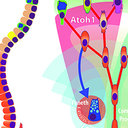A systematic optimization of styrene biosynthesis in Escherichia coli BL21(DE3).
Cuvinte cheie
Abstract
UNASSIGNED
Styrene is a versatile commodity petrochemical used as a monomer building-block for the synthesis of many useful polymers. Although achievements have been made on styrene biosynthesis in microorganisms, several bottleneck problems limit factors for further improvement in styrene production.
UNASSIGNED
A two-step styrene biosynthesis pathway was developed and introduced into Escherichia coli BL21(DE3). Systematic optimization of styrene biosynthesis, such as enzyme screening, codon and plasmid optimization, metabolic flow balance, and in situ fermentation was performed. Candidate isoenzymes of the rate-limiting enzyme phenylalanine ammonia lyase (PAL) were screened from Arabidopsis thaliana (AtPAL2), Fagopyrum tataricum (FtPAL), Petroselinum crispum (PcPAL), and Artemisia annua (AaPAL). After codon optimization, AtPAL2 was found to be the most effective one, and the engineered strain was able to produce 55 mg/L styrene. Subsequently, plasmid optimization was performed, which improved styrene production to 103 mg/L. In addition, two upstream shikimate pathway genes, aroF and pheA, were overexpressed in the engineered strain, which resulted in styrene production of 210 mg/L. Subsequently, combined overexpression of tktA and ppsA increased styrene production to 275 mg/L. Finally, in situ product removal was used to ease the burden of end-product toxicity. By using isopropyl myristate as a solvent, styrene production reached a final titer of 350 mg/L after 48 h of shake-flask fermentation, representing a 636% improvement, which compared with that achieved in the original strain.
UNASSIGNED
This present study achieved the highest titer of de novo production of styrene in E. coli at shake-flask fermentation level. These results obtained provided new insights for the development of microbial production of styrene in a sustainable and environment friendly manner.




